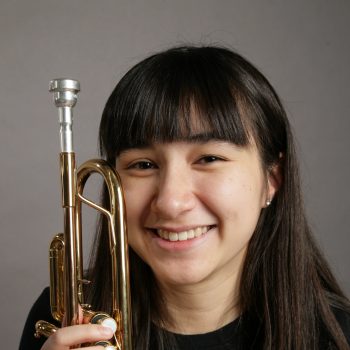Livingstone Undergraduate Research Award in Diversity and Social Justice

Bell Thompson

Gender and Jazz: The Experience of Young Women in Jazz Education
View Bell's project online
My project is a qualitative research study, based on in-depth interviews, conducted with 16 female high school jazz instrumentalists from different regions of the US and Canada. My study examines ‘band culture’ from the perspective of the young women taking part in it. The result is a portrait of their experience and how they make sense of it, offering valuable insight into the challenge of creating music education environments that sustain and support young women.
What is your major and expected year of graduation?
I am a Jazz Studies Performance major. I will be graduating in 2022.
What inspired you to pursue your project?
I loved playing in high school jazz band as a jazz trumpet player; however, each year there were fewer and fewer women taking part alongside me. This experience inspired me to contribute to making jazz education a more sustaining experience for everyone. Understanding the perspective and experience of young female instrumentalists seemed like a good place to start.
I began by looking at what research had been done on young women’s participation in high school jazz education programs, finding there was little on the experience of the girls themselves.
Doing an interview-based qualitative research study provided the opportunity to hear from young female jazz instrumentalists directly, and to gain an understanding, in their words, of what they found significant, and how they made sense of in their experience.
Learning to play jazz is one of the great artistic opportunities available to young people. I want young women to know it is a place for them and hope my research can help create insights for educators that lead us in new directions.
What does winning this award mean to you?
I am so honored to win this award! It inspires me to continue my interest into research that amplifies the voices of young female jazz musicians and transforms jazz education into an opportunity supportive of all young musicians.
How did the Libraries support your research?
I met with Temple librarian, Anne Harlow. She was a critical resource to me in finding and evaluating sources for the literature review section of my project. Anne was able to meet with me on Zoom and walk me through the how-to process of searching for sources using keywords and parentheses, as well as using RefWorks as a citation manager to track what I was finding. Anne also recommended specific databases that would be the best resource for my purposes. After meeting, I was immediately able to find sources on teaching young women improvisation, women’s experiences in music, and how women in jazz have been portrayed in the historical context. I would not have succeeded with my project, much less have been honored with this award, without Anne’s help!
I am delighted that Anabella (Bell) Thompson is the recipient of the Livingstone Undergraduate Research Award. Her research project, “Gender and Jazz: The Experience of Young Women in Jazz Education,” offers an important contribution to research in jazz music education and gender studies. I served as Bell’s faculty mentor and provided supervision for this project as part of the Temple Diamond Scholars program.
The research insightfully highlights girls’ experiences in jazz education. Although girls show high levels of interest in music and represent most of the students studying music in the elementary grades, their participation during the high school years decreases significantly. Within most high school jazz bands only about a quarter of participating students are girls. Bell’s research interrogates the development of young women’s interest in jazz and how these interests and related relationships, with mentors and fellow jazz instrumentalists, shape their involvement in jazz.
Designed to fill this knowledge gap in the literature, Bell’s research draws on qualitative interviews and analysis of data of young women who play jazz in high school bands. The research project documents their gendered experiences in music education and explores attributions of interest and decisions to continue (or not) participating in jazz. Her findings have tremendous implications for music education, generally with implications for the delivery of relevant and responsive music programming for girls and young women.
—James Earl Davis, Professor, College of Education and Human Development
This award is generously sponsored by Gale, a Cengage company.
